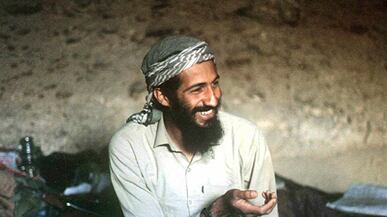The president roasted Donald Trump in Washington, toured tornado devastation in Alabama, and gave a commencement speech in Miami—while directing the secret mission to kill Osama bin Laden. Lloyd Grove on Obama’s uncanny ability to compartmentalize. Plus, full coverage of bin Laden.
Presidents are different from you and me. Certainly Barack Obama is.
On Saturday night, he was joking, laughing, and chitchatting at the head table of the White House Correspondents' Association Dinner. Dapper in his tux, he looked like he didn’t have a care in the world. On Sunday morning he slipped away to Andrews Air Force Base for his regular golf foursome. The round was abbreviated to nine holes by chilly, rainy weather, but that didn’t stop him from practicing drives and spending four hours and 22 minutes outside the White House grounds.
Gallery: Timeline of Bin Laden’s Life

When he returned to the West Wing at 2:04 p.m., he and his national-security team put the finishing touches on the secret mission to take out Osama bin Laden. By 3 p.m. the helicopters were in the air. But one would never have suspected, from outward appearances, that Obama was preparing to roll the dice on a risky military operation half a world away that would define—and maybe even destroy—his entire presidency.
On Monday, as the international community was absorbing the news that the planet’s most-wanted terrorist had just been terminated with extreme prejudice, White House Press Secretary Jay Carney tried to explain Obama’s uncanny, one might say eerie, ability to green-light the most momentous mission of his presidency while touring tornado devastation in Alabama, traveling to Cape Canaveral for an abortive space shuttle launch, delivering a commencement speech at Miami Dade College, skewering Donald Trump at the correspondents' dinner and playing a friendly golf game with aides. “Compartmentalization,” Carney summed up.
C-SPAN political editor Steven Scully, who (as a member of the WHCA board) schmoozed with the president at cocktails and dinner at the Washington Hilton on the eve of the operation, marveled at Obama’s sang-froid.
One would never have suspected that Obama was preparing to roll the dice on a military operation that would define, and maybe destroy, his presidency.
“I thought—when I was coming into work late Sunday night (to cover the announcement of bin Laden’s death)—this guy is an incredible poker player,” Scully told me. “There was no indication that anything like that was going to happen—never a sense that something was going on. He and Mrs. Obama were very gracious and polite, shaking hands with everyone. They were warm and lighthearted and jovial, talking about Sasha and Malia and Bo, and the president was talking sports. (USA Today reporter and WHCA president) David Jackson, who sat next to him, said afterward that he was ‘in fine fettle.’”
Scully went on: “I was talking with the president at cocktails and I said, ‘I hear you’re going to have a video.’ And he said, ‘Oh you heard about it.’ And I said, ‘Do you want to give me a sneak preview?’ And he said, ‘You’re just going to have to wait and see.’ ” Hilariously enough, the president showed the Lion King clip in which Simba is born—a video record, he joked, of his much- disputed birth. Laughter all around. But it turned out that Obama had a genuine shocker up his sleeve. “In hindsight,” Scully said, “I remember that twice he left the head table, apparently to make phone calls—which was unusual.”
Duke University history professor William Chafe, a scholar of presidential character who’s at work on a book about Bill and Hillary Clinton, argued that Obama’s capacity for compartmentalizing is a function of his methodical gamesmanship.
• Osama bin Laden Photos: Is He Really Dead?• Osama bin Laden's Twisted Love Life• Osama bin Laden's Controversial Sea Burial"This seems a classic example of Obama discipline,” Chafe said. “He approaches a political or military situation wanting a full range of options, the risks and possibilities inherent in each choice, and then makes a determination on how to proceed, with an attitude that he has done the best he can and will let the chips fall where they may. Given that approach, he can then—freely—embrace the rest of his schedule and responsibilities, probably never forgetting about what is transpiring, but also pretty well convinced that he has done all he can to move forward.”
While acknowledging that Obama’s knack is abnormal in the annals of human behavior, Chafe compared this president favorably with that other famous compartmentalizer, Bill Clinton (to say nothing of Richard Nixon and Lyndon Johnson, whom Chafe characterizes as “borderline psychotics”).
“Clinton was even more bizarre, because of his lack of discipline,” Chafe said. “There are times when he does show great discipline, but very often he’s afraid to really, in any way, contradict his wife on issues, as when he moved ahead with health-care reform even though he knew it would be politically disastrous.”
Obama, by contrast, “came through the kind of identity crisis that he writes about in Dreams From My Father. Once he decides who he is and what his mission is, that’s a settled question and he moves forward. He’s someone who has more self-awareness and self-knowledge than most of the people who get to the White House. That stands him in very good stead. He’s also the best writer among recent presidents—also the least egomaniacal. He doesn’t see his entire life or ego being on the line with every decision he makes.”
Lloyd Grove is editor at large for The Daily Beast. He is also a frequent contributor to New York magazine and was a contributing editor for Condé Nast Portfolio. He wrote a gossip column for the New York Daily News from 2003 to 2006. Prior to that, he wrote the Reliable Source column for the Washington Post, where he spent 23 years covering politics, the media, and other subjects.






